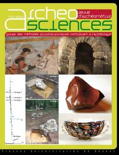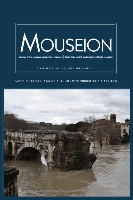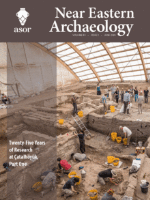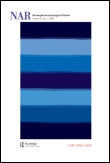
ZEITSCHRIFT FUR AGYPTISCHE SPRACHE UND ALTERTUMSKUNDE
Scope & Guideline
Exploring the Depths of Ancient Egypt
Introduction
Aims and Scopes
- Linguistic Analysis of Ancient Egyptian Texts:
The journal extensively publishes studies on the grammar, syntax, and semantics of ancient Egyptian languages, including Hieroglyphics and Coptic, often exploring their evolution and regional dialects. - Cultural and Historical Studies:
Papers frequently delve into the socio-cultural aspects of ancient Egypt, examining historical events, religious practices, and the daily lives of ancient Egyptians through archaeological findings and textual evidence. - Interdisciplinary Approaches:
The journal encourages interdisciplinary research that combines Egyptology with methodologies from fields such as anthropology, archaeology, and digital humanities, enhancing the understanding of ancient Egyptian civilization. - Onomastics and Prosopography:
A notable focus is placed on the study of names and titles in ancient Egyptian texts, facilitating a deeper understanding of individual identities and social hierarchies within ancient society. - Archaeological Discoveries and Textual Interpretations:
The journal frequently publishes articles on new archaeological findings and their implications for understanding ancient texts and contexts, bridging the gap between material culture and written records.
Trending and Emerging
- Digital Humanities and Textual Analysis:
There is an increasing trend towards the application of digital humanities methodologies in the analysis of ancient texts, enhancing the accessibility and interpretative possibilities of Egyptian writings. - Gender Studies and Female Representation:
Emerging research focuses on gender dynamics and the representation of women in ancient Egyptian society, as evidenced by studies examining female figures in texts and artifacts. - Interdisciplinary Research Incorporating Modern Technologies:
The integration of modern technologies, such as social network analysis and computational models, is gaining traction, providing innovative perspectives on ancient Egyptian societal structures and dynamics. - Scribal Practices and Knowledge Transmission:
Recent papers highlight the importance of scribal practices and the transmission of knowledge in ancient Egypt, reflecting a growing interest in how literacy and education were structured and disseminated. - Cultural Exchange and Influence:
Studies exploring the influence of ancient Egyptian culture on neighboring regions and vice versa are on the rise, indicating a renewed interest in the complexities of cultural interactions in antiquity.
Declining or Waning
- Traditional Archaeological Reports:
There has been a noticeable decline in the publication of straightforward archaeological reports. Earlier issues featured numerous detailed excavation reports, but recent volumes emphasize interpretative analysis over mere reporting. - Comparative Studies with Other Ancient Civilizations:
There has been a decrease in comparative analyses between ancient Egyptian practices and those of other civilizations. This trend suggests a shift towards a more insular focus on Egypt itself rather than exploring its connections with neighboring cultures. - General Overviews of Egyptian History:
Papers providing broad overviews of Egyptian history and culture are less frequent, indicating a move towards specialized studies that delve deeper into specific aspects or periods rather than comprehensive historical surveys.
Similar Journals

ArcheoSciences-Revue d Archeometrie
Fostering Interdisciplinary Insights in Archaeological ScienceArcheoSciences-Revue d Archeometrie is a prominent scholarly journal dedicated to the field of archaeology, published by PRESSES UNIV RENNES in France. With an ISSN of 1960-1360 and an E-ISSN of 2104-3728, this journal has gained recognition for its focus on the intersection of science and archaeological research, aiming to foster interdisciplinary dialogue and innovative methodologies within archaeological studies. Although coverage of the journal has been discontinued in Scopus post-2021, it has maintained a respectable standing with a Q3 Quartile ranking in both the Archaeology (Arts and Humanities) and Archaeology categories as of 2023, as well as commendable Scopus rankings in relevant fields. As an accessible platform for researchers, professionals, and students, ArcheoSciences offers valuable insights into applied techniques and findings in archaeological science, making it an essential resource for those involved in the historical and cultural analysis of material relics. Researchers are encouraged to explore this journal to stay informed about frontier research and ongoing discussions in the discipline.

Lanx-Journal of the Scuola di Specializzazione in Archeologia of the University of Milan
Pioneering new insights in the field of archaeology.Lanx-Journal of the Scuola di Specializzazione in Archeologia of the University of Milan, published by Milano University Press, is a distinguished platform dedicated to the field of archaeology. Committed to advancing archaeological research and scholarship, this Open Access journal has been available to the global academic community since 2008, facilitating easy dissemination of innovative ideas and findings. With a strong emphasis on promoting interdisciplinary dialogue, the journal covers a wide range of topics from classical archaeology to contemporary practices, making it an invaluable resource for researchers, professionals, and students in the field. Situated in the historic city of Milan, it aims to contribute to the preservation and understanding of cultural heritage through rigorous academic inquiry and collaboration.

Journal of Ancient History and Archaeology
Pioneering Insights into Archaeological DiscoveriesJournal of Ancient History and Archaeology is a premier, open-access academic journal published by MEGA PUBLISHING HOUSE since 2014, dedicated to exploring the rich tapestry of ancient civilizations and archaeological discoveries. With ISSN 2360-266X, this journal has made significant strides in the field, achieving elevated rankings across multiple categories, including Q1 in Classics and Q2 in History as of 2023. Positioned in Romania, the journal serves an international audience of researchers, professionals, and students who seek to disseminate and access influential scholarship in ancient history and archaeology. As a prominent resource within the Scopus rankings, it reflects a robust commitment to advancing knowledge through quality research, making it a vital platform for the sharing and discussion of innovative ideas and methodologies. The journal covers a wide array of topics related to ancient societies, enhancing our understanding of their cultural, historical, and archaeological significance.

JOURNAL OF EGYPTIAN ARCHAEOLOGY
Advancing Knowledge in Egyptology and BeyondJOURNAL OF EGYPTIAN ARCHAEOLOGY is a premier publication dedicated to advancing the study of ancient Egyptian culture, artifacts, and historical contexts. Published by SAGE PUBLICATIONS LTD in the United Kingdom, this journal has been an authoritative source of archaeological scholarship since its inception in 1964. It boasts an impressive reputation, currently holding a Q3 ranking in Archeology and Q2 rankings in both Archeology (arts and humanities) and History for 2023, underlining its importance in its field. With a focus on interdisciplinary research, the journal provides a platform for in-depth analysis and discussion among scholars, researchers, and students alike. The journal is also indexed in Scopus, with notable rankings that reflect its influence and reach within the academic community, especially among arts and humanities disciplines. Although it is not an Open Access publication, the insights offered through its meticulously curated articles are invaluable for anyone looking to deepen their understanding of Egyptology and archaeological practices. For scholars seeking to engage with contemporary discussions in this fascinating field, the JOURNAL OF EGYPTIAN ARCHAEOLOGY serves as an essential resource.

Mouseion-Journal of the Classical Association of Canada
Uncovering the past, enriching the present.Mouseion - Journal of the Classical Association of Canada, published by University of Toronto Press Inc, stands as a vital academic resource in the fields of Classics and Archaeology. With a focus on promoting scholarly discourse, this journal provides a platform for original research, critical reviews, and interdisciplinary studies that engage with ancient cultures and their legacies. Since its convergence in 2019, Mouseion has quickly established itself within the academic community, achieving a commendable Q1 ranking in Classics and Q2 in both Archaeology categories in 2023, showcasing its commitment to excellence. While not an open-access journal, it is positioned among the top 29% of classics journals, reflecting its impact and the quality of publications. Nestled within Canada, this journal addresses a global audience of researchers, professionals, and students dedicated to the exploration of the classical world, and it endeavors to contribute significantly to the scholarly understanding of cultural heritage.

Prilozi Instituta za Arheologiju u Zagrebu
Unveiling the past through innovative research and insights.Prilozi Instituta za Arheologiju u Zagrebu is a prominent academic journal published by INST ARHEOLOGIJU, dedicated to advancing the field of archaeology and related historical studies. Operating in Croatia, this journal serves as a vital platform for scholars, researchers, and students to disseminate innovative research and insights within the realm of archaeology, with a focus on the rich cultural heritage of the region. The journal spans contributions from 2002 to 2011 and has ongoing publication since 2013, reflecting its commitment to contemporary archaeological discourse. With a growing reputation, it has achieved a Q3 ranking in the fields of Archaeology and Arts and Humanities, and a Q2 ranking in History, signifying its impact and relevance in the academic community. Although Open Access options are not available, the journal remains an essential resource for those pursuing in-depth knowledge and research in archaeology. Researchers can harness the journal's extensive scope to explore critical historical narratives and archaeological findings, solidifying its importance in both local and global contexts.

Yorkshire Archaeological Journal
Pioneering Research in Yorkshire's Archaeological RealmYorkshire Archaeological Journal, published by Routledge Journals, Taylor & Francis Ltd, stands as a pivotal resource in the field of archaeology, particularly focused on the rich heritage and archaeological research within the Yorkshire region of the United Kingdom. With a dedicated ISSN of 0084-4276 and an E-ISSN of 2045-0664, this journal provides both researchers and practitioners valuable insights into archaeological discoveries, methodologies, and theoretical frameworks. While it holds a Q3 ranking in both Archaeology (Arts and Humanities) and Archaeology (Social Sciences), its contributions remain significant for advancing discussions and knowledge within the discipline. The journal's archival depth, converging from as early as 1980 and continuing robustly into 2024, showcases a commitment to fostering academic discourse and exploration of archaeological heritage. Although it does not currently offer open access, its rigorous peer-reviewed articles make it an essential reference for academics, professionals, and students alike who are eager to deepen their understanding of archaeology and its applications.

Journal of Pacific Archaeology
Advancing Knowledge in Pacific Archaeological StudiesThe Journal of Pacific Archaeology, published by the New Zealand Archaeological Association, serves as a pivotal platform for disseminating cutting-edge research in the field of archaeology across the Pacific region. With an ISSN of 1179-4704 and an E-ISSN of 1179-4712, the journal provides a forum for scholarly discourse aimed at both established researchers and emerging scholars alike. Focusing on the rich tapestry of archaeological studies, it covers a diverse array of topics, from ancient settlement patterns and cultural practices to contemporary analyses of material culture. As an Open Access journal, it ensures that its findings are readily available to all, fostering inclusivity in academic research and enabling practitioners to share knowledge without barriers. The Journal of Pacific Archaeology is indispensable for those committed to understanding the complexities and nuances of Pacific archaeology, making significant contributions to both regional and global archaeological narratives.

NEAR EASTERN ARCHAEOLOGY
Exploring the Rich Tapestry of Near Eastern HeritageNEAR EASTERN ARCHAEOLOGY, published by University of Chicago Press, is a premier journal dedicated to the field of archaeology, particularly focusing on the rich cultural heritage and archaeological findings of the Near East. With an ISSN of 1094-2076 and an E-ISSN of 2325-5404, this esteemed publication provides a vital platform for scholars and practitioners to share their research, insights, and discoveries. The journal holds an impressive ranking in the Q1 quartile for both Archaeology and History in 2023, reflecting its significant impact within these fields and a robust history of scholarly contribution. The journal has been pivotal in shaping discussions around archaeological methodology, theory, and contemporary issues from 2002 to 2024, as it continues to reach a wide audience through various access options. With Scopus rankings placing it in the top percentiles for both History and Archaeology, NEAR EASTERN ARCHAEOLOGY represents an essential resource for researchers, professionals, and students alike, fostering the exploration and understanding of the region's archaeological narrative.

Norwegian Archaeological Review
Diving Deep into Archaeological NarrativesNorwegian Archaeological Review, published by Routledge Journals, Taylor & Francis Ltd, is a leading interdisciplinary journal that has made significant contributions to the field of archaeology since its inception in 1968. With an impressive Q1 ranking in the Arts and Humanities category for archaeology and an 86th percentile ranking in Scopus, this journal serves as a crucial platform for showcasing innovative research that advances our understanding of human history and cultural heritage. The Review provides a diverse range of scholarly articles, critical reviews, and thoughtful discussions, making it an essential resource for researchers, professionals, and students alike. While the journal currently does not offer an open-access option, it continues to maintain high editorial standards and relevance within the academic community, with publication converging up to 2024. The Norwegian Archaeological Review thrives as a nexus for academic discourse, encouraging the exploration of archaeological methodology, theory, and practice against the backdrop of contemporary global challenges.